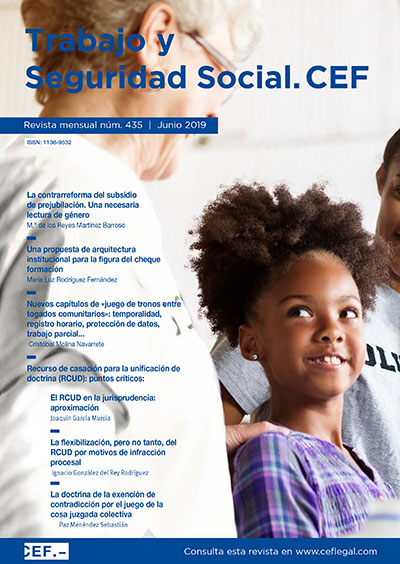Un institutional architecture proposal for the legal figure of the training voucher
DOI:
https://doi.org/10.51302/rtss.2019.1286Keywords:
vocational training, training voucher, skills, accreditation of skills, blockchainAbstract
Once Spanish Royal Decree-Law 3/2012 described the possibility of the legal figure of the training voucher as a way to fund workers’ training, Law 30/2015 and Royal Decree 694/2017 provided the relevant regulations. However, none of these laws has defined the procedures to be followed to implement this legal figure. The purpose of this paper is to provide a mechanics for the training voucher that guarantees unemployed people’s freedom to choose their training and training institution, while avoiding the information asymmetry in the education market and encouraging the creativity and quality of training options. Finally, training accreditation by means of blockchain is proposed.
Downloads
References
Alfonso Arellano, F. (2007). Duración en el desempleo y cursos de formación. Una aproximación al caso español. Cuadernos Económicos de ICE, 74, 167-198.
Aneas Álvarez, A. (2012). Fomentar la empleabilidad y competitividad a través del uso de cheques de innovación y formación. P3T, Public Policies and Territory, 3(1), 23-36.
Bartolomé, A. y Moral-Ferrer, J. M. (2018). Blockchain en educación. El marco. En A. Bartolomé y J. M. Moral-Ferrer (Eds.), Blockchain en educación. Cadenas rompiendo moldes (pp. 13-34). Barcelona: LMI. (Colección Transmedia XXI). Recuperado de http://www.lmi.ub.es/transmedia21/pdf/10_blockchain.pdf (consultado el 8 de febrero de 2019).
CEDEFOP. (2009). Individual learning accounts. CEDEFOP panorama series 163. Luxembourg: Office for Official Publications of the European Communities.
Doerr, A., Fitzenberger, B., Kruppe, T., Paul, M. y Strittmater, A. (2014). Employment and Earning Effects of Awarding Training Vouchers in Germany. ZEW Discussion Papers, n.º 14-065. Mannheim: Zentrum für Europäische Wirtschaftsforschung (ZEW). Recuperado de http://ftp.zew.de/pub/zew-docs/dp/dp14065.pdf (consultado el 8 de febrero de 2019).
Gómez Sánchez, V. (2017). La formación para el empleo en España. Recuperado de http://www.adams.es/site/downloads/La-formacion-para-el-empleo-en-Espana (consultado el 8 de febrero de 2019).
Hidalgo, D., Oosterbeek, H. y Webbink, D. (2014). The impact of training vouchers on low-skilled workers. Labour Economics, 31, 117-128.
Hipp, L. y Warner, M. E. (2008). Market forces for Unemployment? Training Vouchers in Germany and the USA. Social Policy & Administration, 1(42), 77-101.
Kaplan, D., Novella, R., Rucci, G. y Vazquez, C. (2015). Training Vouchers and Labor Market Outcomes in Chile. IDB Working Paper Series, n.º IDB-WP-585. Washington D. C.: Inter-American Development Bank (IDB). Recuperado de http://hdl.handle.net/10419/115524 (consultado el 8 de febrero de 2019).
Mato Díaz, F. J. y Cueto Iglesias, B. (2008). Efectos de las políticas de formación a desempleados. Revista de Economía Aplicada, 46(16), 61-84.
Perez-Johnson, I., Moore, Q. y Santillano, R. (2011). Improving the Effectiveness of Individual Training Accounts: Long-Term Findings from an Experimental Evaluation of Three Service Delivery Models. Recuperado de https://www.mathematica-mpr.com/our-publications-and-findings/publications/improving-the-effectiveness-of-individual-training-accounts-longterm-findings-from-an-experimental-evaluation-of-three-service-delivery-models (consultado el 8 de febrero de 2019).
Sanders, J. y De Grip, A. (2004). Training, task flexibility and the employability of low-skilled workers. International Journal of Manpower, 1(25), 73-89.
Van der Beken, W., Valsamis, D., De Coen, A. y Vanoeteren, V. (2015). Employment and Skills Aspects of Digital Single Market Strategy. Brussels: European Parliament. Recuperado de http://www.europarl.europa.eu/RegData/etudes/STUD/2015/569967/IPOL_STU(2015)569967_EN.pdf (consultado el 8 de febrero de 2019).



















